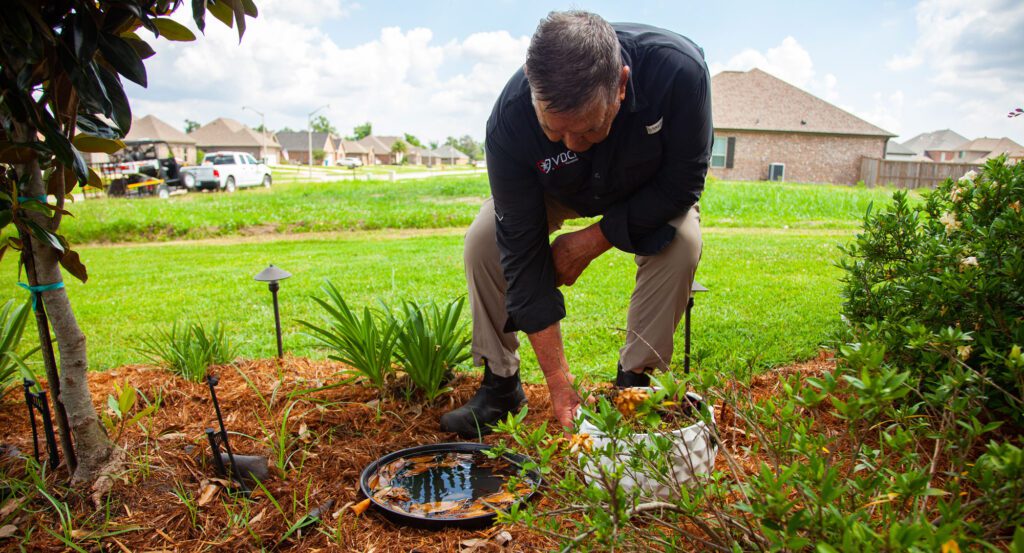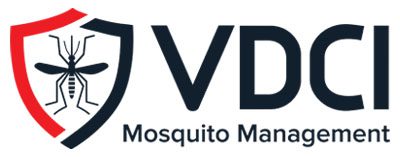Remove Mosquito Breeding Habitats & Use Personal Protection Strategies
While there are more than 3,000 species of mosquitoes in the world, there are fewer than 200 species in the United States. Regardless of the number of species, mosquitoes play a significant role in how American communities and individuals enjoy outdoor activities. To what extent you’ll be affected depends on the climate, desirable habitat, and several other factors and variables unique to your region.
Some mosquitoes are a nuisance for leaving itchy, red, and bumpy bites on us while others are a carrier for disease pathogens, such as eastern equine encephalitis (EEE), St. Louis encephalitis (SLE), heartworm disease, Zika, and the #1 reported mosquito-borne disease in the U.S. – West Nile virus.If mosquitoes are a regular pest where you live, you’ll notice that they’re usually active at certain times. Although it always feels like they choose to invade during your barbecue with family and friends.

What Attracts Mosquitoes to Us?
The carbon dioxide we exhale, components of our perspiration, physical movement, and body warmth attract mosquitoes. Using their long antennae, palps (organs used for detecting scents) and eyes, female mosquitoes can find and pinpoint the location of a blood meal.
Why Do Female Mosquitoes Bite Us?
While both male and female mosquitoes feed on nectar for nourishment and sustenance, only the females bite us for a blood meal. After mating, female mosquitoes need to produce eggs. It is from her blood meal that she gets the various proteins and nutrients required for to produce egg batches. A female mosquito will often bite multiple times to get enough blood for all the eggs she wants to lay. It’s during this feeding cycle that she can pass along disease pathogens to her animal or human host.
When Do Mosquitoes Bite Us?
The biting behavior of the mosquito depends on the species. Some species, such as those belonging to the Culex and Anopheles genera, are more active from dusk until dawn. Some species are active for very specific periods of time during those overnight hours. Other mosquito species, mostly belonging to the Aedes genus, are active biters during the day. This makes it important to consider mosquito prevention measures regardless of the time of day.
Where Are Mosquitoes Found?
Mosquito eggs and larvae
Mosquito eggs can be found at the edge of a water line or resting on the top of the water’s surface. Larvae hatch out and grow in these water sources, which can include water-collecting depressions, tire ruts, ditches, tree holes, and various artificial habitats created by people. These artificial habitats can include poorly maintained swimming pools, buckets and containers, playground equipment, clogged gutters, and even the catch trays of decorative planters.
Mosquito adults
During the day, most mosquitoes can be found resting in cool, shady areas, primarily in dense vegetation or animal burrows and other protected places. They can also be found resting on or inside of buildings.

What Can Homeowners Do to Reduce the Risk of Mosquito Bites?
Below are some tips to help reduce larval habitat and adult harborage areas, prevent mosquitoes from entering your property, and personal protection measures to consider when you are outdoors.
- Keep grass cut and shrubbery trimmed near the house where adult mosquitoes may rest.
- Water lawns and gardens carefully to prevent water from standing for more than five days.
- Keep drains, ditches, and culverts clean of weeds and trash so water can flow properly.
- Fill in, or drain, low spots (puddles, ruts, etc.) in the yard where water collects.
- Fill in tree holes and hollow stumps that hold water with sand or concrete.
- Stock ornamental pools with surface feeding fish such as minnows and goldfish.
Monitor the Exterior of Your Residence
- Clean debris from rain gutters to allow proper drainage.
- Check around outdoor faucets and air conditioner units and repair leaks or puddles.
- Check window and door screens to ensure they are in good condition and seal tightly.
- Eliminate seepage from cisterns, cesspools, and septic tanks.
Tip and Toss Water in Utility and Decorative Containers
- Ensure lids of trash and recycling containers are on properly to keep out rainwater.
- Drill small holes in the bottom of these containers to prevent water from collecting if lids are unavailable.
- Dispose of old tires, cans, buckets, bottles, or any other water-holding containers.
- Change the water in pet bowls, birdbaths, watering troughs, plant pots or drip trays at least once per week.
Drain and Cover Outdoor Recreational Equipment and Children’s Toys
- Canoes and Boats: Store small boats upside down. Cover large boats tightly.
- Make sure that coverings (boats, pools, compost piles, etc.) are pulled tight and sloped to allow water to drain.
- Empty plastic wading pools at least once per week and store indoors when not in use.
- Make sure your backyard pool is properly cared for while away from the home.
- Drill holes in the bottom of tire swings to allow any water to drain.
Mosquito Prevention Checklist: Follow the 4Ds
- Use EPA-approved repellents on skin and clothing (always follow product label directions for use).
- Wear long-sleeve shirts and long pants that are loose-fitting for extra protection.
- If you are outdoors at dusk and dawn, when many mosquito species are most active, protect yourself.
- Encourage friends, family, and neighbors to follow these recommendations also.
Understand Existing Mosquito Management Efforts in Your Community
Do you know if your community has an established mosquito management program?
There are many strong integrated mosquito management (IMM) programs across the United States! Check with your local government to learn more about the efforts taking place in your community. Program managers may be able to offer additional details on mosquito species in your community, inform you if disease activity exists, and provide you with mosquito management advice unique to your region. We’ve seen mosquito management programs work with individuals and community groups to organize trash or tire clean-ups, distribute mosquito-eating fish for backyard ponds, visit schools, and more to provide public education and mosquito management support to residents.
Mosquitoes don’t respect geographical boundaries – your mosquito problem can quickly become an issue for your neighbors. It’s important to remember it takes effort by everyone to monitor and reduce mosquito habitat.
If you would like more information about any aspect of an Integrated Mosquito Management (IMM) Plan, including mosquito surveillance, disease testing, adult control, aerial applications, resistance testing, or creating an emergency response plan (major flood event or disease outbreak) – please contact Vector Disease Control International (VDCI).
Contact Us to Learn More About Mosquito Management
 Since 1992, Vector Disease Control International (VDCI) has taken pride in providing municipalities, mosquito abatement districts, industrial sites, planned communities, homeowners associations, and golf courses with the tools they need to run effective mosquito control programs. We are determined to protect the public health of the communities in which we operate. Our mosquito control professionals have over 100 years of combined experience in the field of public health, specifically vector disease control. We strive to provide the most effective and scientifically sound mosquito surveillance and control programs possible based on an Integrated Mosquito Management approach recommended by the American Mosquito Control Association (AMCA) and Centers for Disease Control and Prevention (CDC). VDCI is the only company in the country that can manage all aspects of an integrated mosquito management program, from surveillance to disease testing to aerial application in emergency situations.
Since 1992, Vector Disease Control International (VDCI) has taken pride in providing municipalities, mosquito abatement districts, industrial sites, planned communities, homeowners associations, and golf courses with the tools they need to run effective mosquito control programs. We are determined to protect the public health of the communities in which we operate. Our mosquito control professionals have over 100 years of combined experience in the field of public health, specifically vector disease control. We strive to provide the most effective and scientifically sound mosquito surveillance and control programs possible based on an Integrated Mosquito Management approach recommended by the American Mosquito Control Association (AMCA) and Centers for Disease Control and Prevention (CDC). VDCI is the only company in the country that can manage all aspects of an integrated mosquito management program, from surveillance to disease testing to aerial application in emergency situations.

